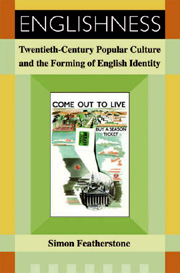Introduction: Being English
Published online by Cambridge University Press: 12 September 2012
Summary
In the weeks before 23 April it is now possible to buy a range of gifts – cards, mugs, sweatbands – displaying the red cross of St George. This commercial celebration of the English national saint is a relatively recent phenomenon, traceable to the resurgence of the George Flag as a sporting emblem during the 1996 European Football Championships, but also indicative of a new popular performance of nationhood. The nature of this discourse can be judged by the verse of one of the cards available in 2007:
On St George's Day
Petal by petal
A bud becomes a rose
Year by year
England's greatness grows.
The sentiment is simultaneously affirmative and cautious. England is imagined not as a blooming rose but as an opening bud, the sign of a young nation, therefore. For a country that has tended to see itself as ancient this seems strange, but perhaps acknowledging the consequences of United Kingdom devolution over the last ten years, the card industry poet registers a need for a new England to emerge and to celebrate itself through the post. Quite what an appropriate St George's Day greeting might be is unclear and staff of my local card shop were unable to describe a typical purchaser, but the fact of its commercial existence marks a development in the expression of English identity.
The St George's Day card recalls another ambivalent English popular text of the early twenty-first century, overheard at the Trent Bridge Test Match against Australia in August 2005.
- Type
- Chapter
- Information
- EnglishnessTwentieth-Century Popular Culture and the Forming of English Identity, pp. 1 - 8Publisher: Edinburgh University PressPrint publication year: 2008



